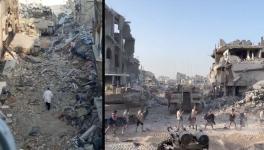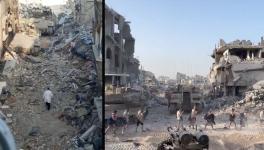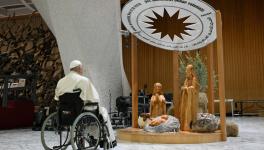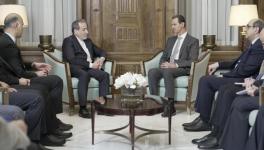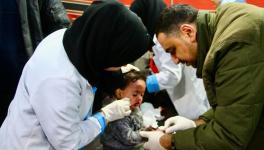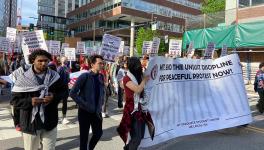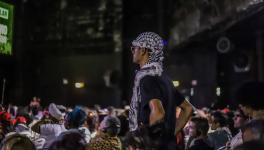The Year of the Watermelon
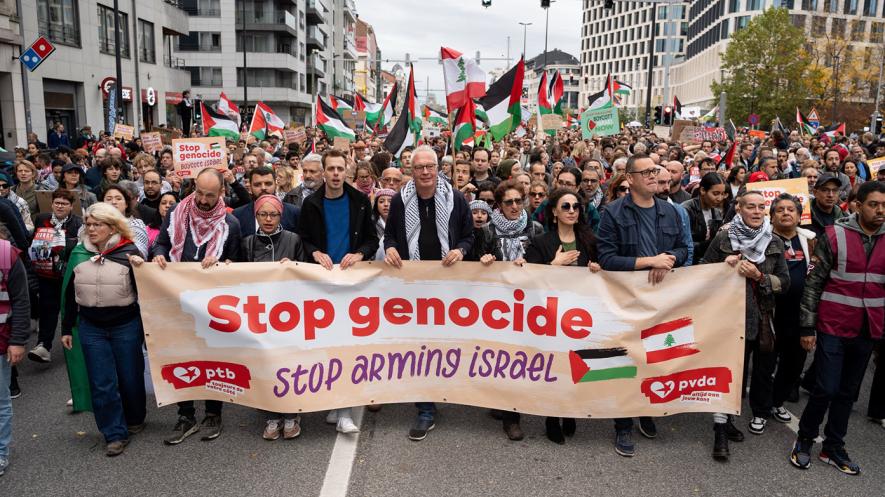
Peter Mertens marches in solidarity with Palestine in Brussels (Photo: Peter Mertens MP/X)
Hayat, child of war, child of hope
Rosie is barely 14 months old when the first rain of bombs falls on Gaza in October. Her mother, Aseel, is pregnant. In December, 25-year-old Aseel gives birth to her second daughter, Hayat, which means “life.”
“At a moment when everything seems lost, she is the hope in our lives,” explains the proud mother.
When Hayat is not even one month old, she is already forced to flee. Deir al-Balah is no longer safe, and everyone has to go to Rafah. Just before Christmas, more than one million Palestinians are crammed together there, half of the population. “To this day, Hayat has not seen a single day of her life without destruction, without explosions, without forced displacement,” her father, Ibrahim, says. “Despite everything, she keeps on smiling.”
Meanwhile, Aseel is at her wit’s end. There is not enough food, and there aren’t enough vegetables for her to breastfeed Hayat. When Hayat develops a fever, she needs antibiotics, but the pharmacists are out of medication. At the hospital, there is an endless line of young mothers. There are no free beds left, so Ibrahim urgently has to find a mattress for his daughter to sleep on in the hospital hallway tonight. “I hope they don’t bomb Rafah,” Aseel says as she holds Hayat in her arms. Hayat, child of war, child of hope.
A live-streamed genocide—how dystopian can it be?
The history of Gaza over the past twelve months is a history of war crimes. Over 42,847 Palestinians have been killed, including 16,765 children and 7,216 women. Presumably, thousands more lie dead under the rubble. Additionally, 100,544 people have been injured, a quarter of whom have sustained “life-altering injuries.” Thousands of limbs had to be amputated. In the first months of the war, every day, 13 children lost one or both of their legs.
Who would have ever thought that someone could broadcast a genocide on television and get away with it? Who would have thought that Israel would be capable of bombing all the hospitals, all the universities, and all the schools? Who imagined that we would witness live on our smartphones how children are burned, how journalists are executed, and how doctors and nurses are killed?
Who would have thought that the war criminal responsible for all this, Benjamin Netanyahu, would then be allowed to travel to the United States and receive a standing ovation from the US Congress? How dystopian is that?
This is the first genocide being live-streamed on our mobile phones: “The genocide is televised.” Although the Israeli army does everything it can to prevent this. According to the Committee to Protect Journalists (CPJ), the genocide against the Palestinians is “the deadliest period for journalists” since data collection began in 1992. In the current genocide in Gaza, more journalists have been killed than in both World Wars and the Korean War combined. The number stands at at least 165 media professionals.
Media experts have calculated that an Israeli victim of this war is mentioned sixteen times more in traditional Western media than a Palestinian victim. Palestinians are deemed unworthy of mention, especially when they are killed by the tens of thousands. In the West, a “deliberate ignorance” is organized: in order to live comfortably, Hayat, Rosie, Aseel, Ibrahim, and all the other Palestinians must be rendered invisible.
Fear of a watermelon
While children in Gaza grow up amidst the stench of bombs and genocide, right-wing and far-right forces in Europe are pushing an agenda to criminalize pro-Palestinian voices.
“Everyone knows that the watermelon is a symbol of support for Hamas. That is the level we have reached here. I hope the cabinet will take the issue of Jew-hatred very seriously,” says VVD faction leader Ms. Yeşilgöz-Zegerius, with a straight face in the Dutch House of Representatives on September 18. The right-wing party wants to ensure that symbols of watermelon are no longer to be seen in or around the Dutch parliament.
In the German Bundestag, Friedrich Merz provides some clarity on the position of his far-right AfD party. In summary: Israel receives too few weapons from Germany to adequately slaughter enough Muslims. In Belgium too, people like Sam van Rooy from the extreme-right Vlaams Belang party flaunt their inflammatory support for the Israeli war machine.
The more death is normalized, the more racism and colonialism are normalized, the more genocide is normalized, the more far-right parties are also normalized. There is an inseparable connection between the two. The far-right is the ideology of hatred, racism, oppression, and genocide.
“Israel has become a political pariah”
On September 18, 2024, the United Nations General Assembly adopted a resolution demanding that Israel withdraw from the occupied Palestinian territories of East Jerusalem, Gaza, and the West Bank within the next twelve months. The resolution passed with an overwhelming majority: 124 countries voted in favor, and 12 against. This is the very first time the General Assembly has condemned the apartheid regime, and also the first time it has called for sanctions to put an end to the illegal occupation.
The decision aligns with the ruling of the International Court of Justice in The Hague. For the first time since its establishment in 1948, Israel was summoned before the highest legal body of the United Nations. In July 2024, the Court declared Israel’s occupation of Palestine illegal and urged member states to take decisive measures to end the occupation.
Israel ignores the ruling and does the exact opposite. Over the past year, the United States has delivered more than ten thousand bombs weighing two thousand pounds each, which are used to turn schools, hospitals, mosques, and safe zones into craters and graveyards. Meanwhile, Palestine counts 1.9 million internally displaced persons, and more than 345,000 people are facing catastrophic levels of food insecurity.
What does all this mean?
First and foremost, it means that Israel is completely isolated on the international stage. The country has become a political pariah in the eyes of the vast majority of the world’s population. Diplomatically, Israel is in a coma and is only kept upright by the military and economic lifeline provided by the United States.
Secondly, it means that an increasing number of countries are challenging the dominant discourse from Washington and Berlin, and are telling a different story, being fed up with decades of colonialism and neocolonialism. In the US, they call this a ‘mutiny’ of the Global South against what they see as the collective West.
Thirdly, it indicates that the international legal system is failing completely. Everyone knows that international law and universal human rights only matter when they are consistently applied, even against the most powerful nations and the world’s greatest aggressors. It is only logical that an increasing number of countries in the Global South want to create their own agenda for a fairer international legal system, free from neocolonial influences.
“A stroke of genius”
On September 17, the Israeli army detonated a series of beepers, walkie-talkies, and radios in Lebanon. At least 37 people are killed, and more than 3,000 are injured.
“Anyone who has a radio or a cellphone at home should think twice. That is the message the Israelis are sending us with this attack. Every family, every child is at risk. Every person is a potential enemy. Whether you like it or not, Israel has just made it clear that they are capable of killing you in your own home,” says Lebanese journalist Ghadi Francis.
“A stroke of genius,” as Georges-Louis Bouchez referred to this cowardly terrorist attack. When I confronted him in parliament with his statement, the president of the Liberal Party MR stormed up to the chair of the Chamber of Representatives, hoping to stop me from speaking out.
In the “great reversal,” the oppressor is made into a victim, while the mass murderer is cloaked in a moral aura. “The Israeli Defense Forces are the most moral army in the world,” said Israeli Prime Minister Netanyahu at the beginning of his campaign of destruction. “Whoever dares to accuse our soldiers of war crimes,” he stated, “lacks so much as one drop of morality.” This turns everything upside down.
That cloak of concealment is pulled away by Israeli soldiers themselves. They fill their social media with the most gruesome photos and videos. Cheerfully smiling in front of exploded houses, flaunting stolen goods, posing in the underwear of Palestinian women—this has apparently become a trend—boasting about extreme violence or torture.
“The language used in Israel is extremely dehumanizing, and that is typical of genocide,” explains UN rapporteur Francesca Albanese. “Look at the words that Israeli soldiers and politicians have used, such as ‘rats,’ ‘roaches,’ ‘vermin.’ These are words that now lead to the destruction of everything Palestinian. From schools to homes, universities, and farmland necessary for sustenance.”
Language matters. When notables get away with murderous rhetoric, why would ordinary people behave differently? “Expel the traitors!” is emblazoned on a large billboard on the Ayalon, the ring road of Tel Aviv. The traitors are all those who advocate for peace and oppose colonization. Words like “traitors,” “fifth column,” and “useful idiots of Hamas” are the norm. After the language comes the arrests. And after the arrests come the executions.
“No one can be free until Palestine is free”
There are people who say that you shouldn’t stick your neck out to stop a genocide. That there are more important things in life, that it won’t make a difference, that there needs to be more nuance. There are people who argue that we should reach a state of acceptance and resignation regarding the world as it is.
“Follow your path, and let the people talk,” said Dante. In this period of human history, in times of genocide, raising your voice is the least you can do. That is what people are doing worldwide. Those who want to see beyond the dust and chaos of today, will recognize a movement rising from Jakarta to Brussels, from London to Johannesburg, and from Istanbul to Washington. Never have so many young people across the world, from Japan to Brazil, spoken with one voice: in solidarity with Palestine.
In the 1960s and 1970s, students occupied universities to protest against the Vietnam War and US imperialism. In the 1980s, students occupied campuses to protest against apartheid in South Africa. Today, students around the world are taking action against the genocide perpetrated by Israel, against impunity, and against the double standards at play.
Each time, students were vilified, attacked, and condemned. But each time they were right, and each time they won. This is the Vietnam moment for a new generation that knows: “No one can be free until Palestine is free.”
Sand in the war machine
The Palestinians do not ask the world for “charity” or “compassion.” They ask for justice. And they demand an end to complicity at last.
It is incomprehensible that after a year of genocide our country, Belgium still has not imposed an airtight military and economic embargo against Israel. The Vivaldi coalition, containing two socialist and two green parties, did impose such measures against Russia but not against Israel. That is a very painful fact.
The weak point of the war machine is arms shipments. “Deutsche Waffen, deutsches Geld morden mit in aller Welt,” goes an old slogan, which translated to “German weapons and German money kill all over the world.” This is even more true for American and British weapons. Over the past five years, 79% of all arms supplied to Israel have come from the United States, and 20% from Germany.
Washington continues to fuel Israel’s war machine with an unrelenting stream of financial and military support. No other country in the world has received as much military aid from the US as Israel. Just in the past year alone, Washington provided USD 17.9 billion in military assistance, as calculated by Brown University in early October. Since 1959, a total of USD 251.2 billion in military aid has been transferred to Israel, according to the Brown University report.
Part of that arms trafficking goes through European ports and airports. At one point, a worker at Brussels Airport was loading cargo and saw boxes destined for Tel Aviv. Together with a colleague, he discovered that these were military supplies on their way to Israel. They proposed discussing this with the union. No sooner said than done, eventually, the union decided to boycott the transport. This was followed by a general boycott from the transport workers’ union to stop transporting weapons to Israel.
It all began with one worker saying no. And then another one. And then a union. And then another union. And then unions worldwide, from Italy to Australia, from India to Canada. The student movement denounces the hypocrisy and double standards of imperialist wars. The labor movement is throwing sand into the imperialist war machine itself. We are de-normalizing apartheid, we are de-normalizing colonization, we are de-normalizing genocide, we are de-normalizing imperialism.
This is the year of the watermelon. This is the year of Hayat, child of hope.
Get the latest reports & analysis with people's perspective on Protests, movements & deep analytical videos, discussions of the current affairs in your Telegram app. Subscribe to NewsClick's Telegram channel & get Real-Time updates on stories, as they get published on our website.











